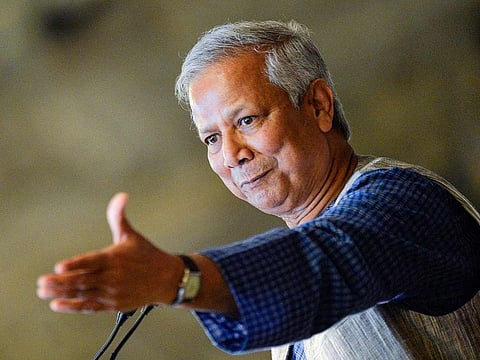Muhammad Yunus appointed head of Bangladesh's interim government
Decision was taken at a meeting of the President, military, and student leaders

Dhaka: Nobel Prize-winning economist Muhammad Yunus has been appointed the head of Bangladesh's interim government, a key step toward restoring order after weeks of protests drove former Prime Minister Sheikh Hasina from the country.
The widely expected decision to tap the high-profile development banker was announced by President Mohammed Shahabuddin's office, who had earlier met with the country's armed forces and protest leaders, who called for Yunus to take the role.
"The country is now going through a transitional period. It is important to form an interim government as soon as possible to overcome this crisis," Shahabuddin said.
Yunus will return to Bangladesh "soon," protest leader Nahid Islam said in a televised briefing in the capital Dhaka on Tuesday night, adding members of the interim government have yet to be finalised.
What started out in late June as peaceful protests seeking to abolish a government jobs quota turned into deadly unrest in recent weeks with demonstrators seeking to oust Hasina, who had shown little sign of backing down. Her sudden resignation follows a weekend of student-led clashes with pro-government supporters that pushed the death toll from the violence since mid-July to about 350 people, according to news reports and data from local hospitals and police stations.
Yunus' top task will be to restore calm after Hasina, who turned Bangladesh into an economic success and ruled with an iron fist, fled Monday to India and her official residence was ransacked. Shahabuddin, backed by the country's powerful military, has vowed to hold elections "as soon as possible."
Yunus, 84, who pioneered micro-loans as a tool to fight poverty, had faced legal trouble under Hasina that he has called politically motivated.
Hasina was the world's longest serving female head of a government, winning a fourth term as prime minister in an election in January that was boycotted by her opponents and voters. The US, the biggest buyer of Bangladesh's exports, had criticized the polls, and imposed visa curbs on members of Hasina's party and law enforcement officials in September.
While Hasina's Awami League party dominated parliament, the army chief invited none of its members to talks on forming an interim government. On Monday, thousands of jailed protesters were freed, as well as Hasina's rival and opposition leader Khaleda Zia - a former prime minister herself.
Sign up for the Daily Briefing
Get the latest news and updates straight to your inbox



